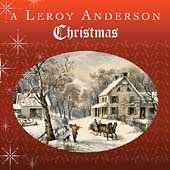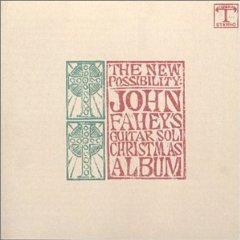No Words Necessary
By David McGee
A LEROY ANDERSON CHRISTMAS
Decca Records
THE NEW POSSIBILITY: JOHN FAHEY'S GUITAR SOLI CHRISTMAS ALBUM/CHRISTMAS WITH JOHN FAHEY, VOL. II
Rhino
Original albums released 1968 (The New Possibility) and 1975 (Vol. II)
Reissued: 1993
If you were to select only a pair of all-instrumental albums of holiday music, you could hardly do better than the two disparate titles here. Composer/conductor Leroy Anderson and guitarist John Fahey come at their seasonal musings from quite different perspectives, but both wind up in a place of joyous reverence for the magnificence and timelessness of Christmas carols and hymns.
Anderson, a Harvard-educated student of Walter Piston and George Enescu, became the arranger and orchestrator of the Boston Pops in 1946 and composed some of the quirkiest light orchestral music, well, ever. He tended to be unpredictable when it came to employing the tools of his trade, calling into service, for instance, a typewriter for his 1950 composition, "The Typewriter," which does indeed feature a rapidly firing manual typewriter as an intricate component of the melody. His 1954 "Sandpaper Ballet" uses, yes, sandpaper for effect. But it was his 1948 composition, "Sleigh Ride," that put him on the Christmas music map for all time and surely provides the Anderson heirs with a healthy royalty check each year, oft played as the song is once the cold air settles in and the holidays beckon. If ever notes, chords and sound effects (wood blocks emulating the clip-clop of horses' hoofs, and the snap of a whip as the horses gallop along) captured the spirit of a season, and nostalgia for a simpler time when horse-drawn sleighs were common, it is those in the ebullient, infectious and ever-fresh "Sleigh Ride."
The Arthur Fiedler-conducted Boston Pops' version of "Sleigh Ride" kicks off the wonderful Leroy Anderson Christmas, but the remainder of the disc is solely Anderson and His Orchestra. Following "Sleigh Ride" is a powerful medley of religious-oriented Christmas standards titled "A Christmas Festival" (which served as the title of Fiedler and the Pops' wonderful Christmas album from the vinyl era, A Christmas Festival, yet to be reissued on CD), beginning with the resounding, majestic brass introducing "Joy to the World" and thereafter deploying the orchestral textures in their full range of colors in passages both whimsical and lighthearted, soaring and triumphant, weaving together 10 familiar carols. This medley serves as a musical blueprint for what follows: three Suites of carols, one each for Brass Choir, String Orchestra and Woodwind Ensemble. A bold heralding of themes and the purposeful stride of instruments developing the melodies, reminiscent of Anderson's approach in "A Christmas Festival," mark the Brass section. Similarly, the String Orchestra follows the pattern established at the outset of playing alternately in the lively, intimate spirit of a string quartet and then deploying the gentle, humming tonalities it brought to the softer orchestral passages of the "Festival." The woodwinds are properly placed as the closing Suite. The instruments' many colors, interwoven as they are, seem to float in an ambiance of rapidly changing tempi and moods. Surely Anderson purposely selected for this section carols expressing the most solemn and spiritual evocations of the holy night, including "Angels In Our Fields" (better known as "Angels We Have Heard On High"), "O Sanctissima," "O Come, O Come Emmanuel" (the oboe solo on which is absolutely haunting in its stark, introspective beauty), "O Come Little Children," the humbling, prayer-like "Coventry Carol" and, to close out the Suite, the exotic, frisky "Patapan." As a reprise, following the Suites, we return to "Sleigh Ride"—and then the ride is complete, so joyous and moving all at once it's a shame it ends. So you hit "Repeat" on your CD player—the record really has that kind of staying power.
Fahey, playing solo on The New Possibility and dueting with Richard Ruskin on Vol. II, achieves grandeur in increments, as the beauty of his arrangements unfolds from cut to cut, his wit and humility both surfacing in equal measure in his unassailable artistic choices. In "What Child Is This," a quiet, searching inquiry, he enhances the wondrous mood with unusual chordings; a medley of "Hark! The Herald Angels Sing" and "O Come All Ye Faithful," performed with a jolly country feel, makes a seamless transition to a minor mode for a thoughtful reading of "O Come All Ye Faithful"; playing in an open C tuning and making effective ambient use of glissandos, Fahey wrings all the wistfulness out of a tender version of "Auld Lang Syne"; on "Good King Wenceslas" his deliberate picking, contrasted with a resonant strummed chord and a pause at the end of each verse, conjures the chilly, daunting feel of snow laying 'round about, deep and crisp and even. On a fanciful note, it's likely no one's ever played "God Rest Ye Merry Gentlemen" as Fahey offers it here, with pronounced rock 'n' roll drive and a couple of verses punctuated by a chord progression with a distinct '50 feel, specifically lifted from the song "Red Cadillac and A Black Moustache," one of Warren Smith's lesser known but truly inspired Sun recordings (although Fahey's own liner notes say he copped it from a Bob Luman record). In contrast, "Silent Night, Holy Night" is as tender as it could be, Fahey staying true to the melody and picking and chording with quiet dignity, honoring the song's sentiment with no embroidery or musical editorial commentary of his own, save his respect for the tune. With Ruskin in tow, he crafts a moving interpretation of "Oh Holy Night," contrasting his heavier sound with Ruskin's feathery, chiming tone (a result of Ruskin having removed all the heavy strings from his instrument). Like the sturdy blues Fahey offers solo on the black spiritual "Go I Will Send Thee"on The New Possibility, his and Ruskin's dialogue on "Russian Christmas Overture," a Fahey arrangement incorporating quotes from secular classical compositions by Rimsky-Korsakov and Prokofiev, enlarges the palette of seasonal fare by finding poetry hidden to others' ears; Fahey and Ruskin split the lead parts, and clearly take delight in baffling listeners with what will come next—a taste of minor-key Russian melodrama here, a frisky, fleet-fingered country blues riff there and a breathtaking restating of the establishing theme at the most unexpected moments, as a kind of link between the brusque Russian and folksy American backwoods segments. It's a beautiful dialogue, and, appropriately, is the only song on the disc that doesn't want to end—it fades out instead. Side two of the vinyl version of Vol. II contained an ambitious original composition in two parts, titled "Christmas Fantasy." Alas, in transferring both albums to CD, Rhino ran out of space on the disc, and only Part II of the "Christmas Fantasy" is here. It's a sprawling work, with some original passages, atonal segments, impressionistic fingerpicking passages, and snippets of Christmas carols popping up throughout. The feel of the whole piece is meditative, Fahey exploring not only the tones and dynamics of his guitar but the moods of the Yuletide season. It closes the album on a reflective note, even if it is only part of a larger, and quite moving, meditation.
So, Leroy Anderson and John Fahey—strange bedfellows it might seem, but sharing common ground as American celebrants of the Christmas season. Neither artist speaks or sings a word on these discs, but what comes through their instruments—an orchestra, in Anderson's case; guitars, in Fahey's—tells us all we need to know about their respect for the mystery and the meaning of the defining event of the season in question and their innate understanding of its many complexities. Noel!
Founder/Publisher/Editor: David McGee
Contributing Editors: Billy Altman, Laura Fissinger, Christopher Hill, Derk Richardson
Logo Design: John Mendelsohn (www.johnmendelsohn.com)
Website Design: Kieran McGee (www.kieranmcgee.com)
Staff Photographers: Audrey Harrod (Louisville, KY; www.flickr.com/audreyharrod), Alicia Zappier (New York)
E-mail: thebluegrassspecial@gmail.com
Mailing Address: David McGee, 201 W. 85 St.—5B, New York, NY 10024



